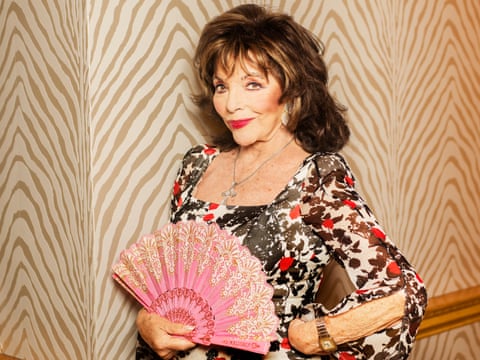Joan Collins steps out of the chauffeur-driven limo – white frock, wide-brimmed white hat, huge shades, rocks on her fingers. Even if she wasn’t Joan Collins, you would stop to look. Some people just have the air of a star. At 90, hers shows no sign of waning – although, as she reminds me a number of times, we don’t discuss age in Dame Joan’s world.
This is one of her favourite restaurants, close to her home in south-west London. We are here to talk about her new one-woman show and book, called Behind the Shoulder Pads. The head waiter directs us to our table in the corner. He is delighted to see Collins. And Collins is delighted to be here. She loves her food.
“The asparagus with soft poached eggs is very good. And the gnocchi. Everything’s good, Simon. If you’re going to have a starter, the carpaccio is great.” She pauses. “Are you a vegan?” The question has an accusatory tone. After all, this is the Guardian, and Collins has never done a proper sit-down interview with us before. Although a voracious newspaper reader, she does not find the Guardian sympatico. “I’m not interested in what they write. I have tried. Sorry about that. People say: ‘Stay away from the Guardian, for God’s sake.’”
What persuaded you to talk to us? She points to her friend and publicist Alex, who is sitting at the table with us. “She did! She had to persuade me.”
I think you’re safe with me, I say.
“I think I am.”
And I’m not vegan, I tell her. So it’s carpaccio all round for starters.
“It’s really hot in here,” Collins says. “They usually have air-conditioning.”
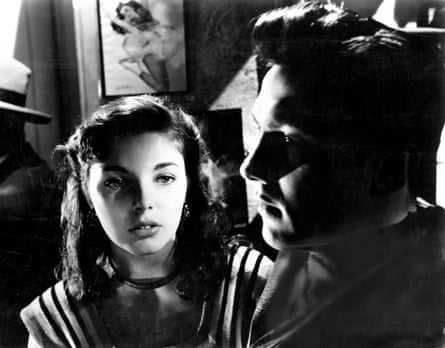
No problem. She reaches into her handbag, pulls out a battery-operated fan and sits it on the table. Collins looks pleased with herself. “A girlfriend bought it for me last year. It’s brilliant. Here, try it.” She talks in a hybrid accent reminiscent of mid-20th century British Hollywood stars such as Cary Grant.
The head waiter returns to the table.
“A few things about the menu,” he says. “Today, I’m afraid the carpaccio is not available and I cannot cut any ham, but I can do the buffalo with tomatoes instead of ham.”
“Oh dear,” a disappointed Collins says. She picks herself up. “What’s the special?”
“We don’t have any, madam. Today, we are making some work in the kitchen.”
“Can you do a salad?” she asks.
“Yes, of course, madam. We have on the menu the courgette salad – tiny slices of courgettes with parmesan.”
She looks horrified. “No, I don’t like courgettes. Can you do a simple mixed salad?”
“Lettuce and tomatoes?” he says.
“Yes, just very simple. Lettuce, tomatoes and avocado.”
“We don’t have any avocado, madam.”
“Do you have any lime juice?”
“Oh, we can make some for you.”
“No, not fresh,” she says. “Bottled.”
“No, sorry, madam.”
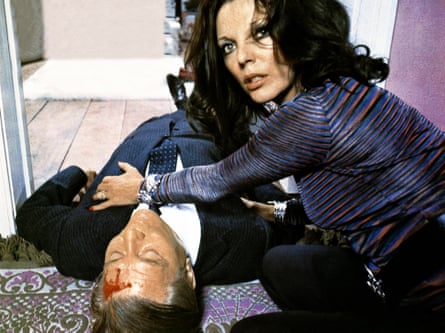
It could be a scene from Fawlty Towers, but Collins handles it with grace. Fortunately, the asparagus and eggs is still on the menu, and she settles for the tomato and lettuce salad to start.
A glass of rosé, I suggest. Collins says she couldn’t. Last night, she celebrated her daughter Tara’s birthday. “To be honest, I’m a bit hungover.”
Collins has been famous for longer than most of us have been alive – and in different ways. She got her break as an actor at 17, cast as a juvenile delinquent in the film I Believe in You. In her first few movies, she played bad girls, quite at odds with the young Collins. “I don’t know if you ever saw any of those. I’m talking about my Rank films – and rank they were!”
In 1955, she was signed by 20th Century Fox and touted as the new Elizabeth Taylor. Although a household name, she never quite lived up to that billing. Collins gave up on movies for much of the 1960s to bring up the first two of her three children. After a stint in horror movies, such as Tales From the Crypt, in the early 1970s, a very different Collins emerged in the late 1970s with two hugely successful soft-porn films, The Stud and The Bitch. That paved the way for her best-known role, as the scheming narcissist Alexis Colby in the US soap opera Dynasty.
She has written 19 books, including a number of bestselling bonkbusters (like her sister, Jackie Collins, who was worth an estimated £120m when she died in 2015) and has been a columnist for the Spectator magazine. But Collins is also famous for her private life.
She has been married five times, most happily to her current husband, Percy Gibson, and her lovers have included Warren Beatty, Ryan O’Neal, Marlon Brando and Harry Belafonte.

I ask Alex how she got to know Collins. She says she was friendly with her daughter Tara. “I’ve known Joan since I was a little girl. But Joan didn’t have time for me in those days.”
“Oh, that’s nice!” Collins says. “Yes, go on: cement my reputation as a bitch!”
Is that an unfair reputation? “Yes, I think it’s really unfair. Just because I played Alexis so brilliantly – she said modestly – I’m tarred with her, and the producers really enjoyed making it as if I were her. All the publicity they put out – they had a direct line to the National Enquirer.
“I remember meeting Kirk Douglas on a boat in Cannes, as you do, when I was publicising The Bitch, and all of a sudden this balloon goes up over the sea with a big banner saying ‘Joan Collins is The Bitch’. And I said: ‘Oh my God, Kirk, I hate that – it should be “Joan Collins as The Bitch”,’ and he said: ‘Honey, that’s really good news – that means you’ve really made it.’ I said: ‘I thought I made it a long time ago.’”
So it was all marketing? “Well, it worked for them. I can’t say I was thrilled with being constantly labelled a bitch. It’s quite hurtful and unkind, and most people who know me don’t think I am. But I am outspoken and I don’t suffer fools by any means.” She gives me a sharp look.
Have you met many fools in your life?
“I’ve married too many of them!”
But you’ve found the right man now?

“Oh yes, Percy and I have been married for 21 years and it’s just marvellous.” There was much talk in the early days about him being 32 years younger. When asked about it, she replied: “Well, if he dies, he dies.” She is a natural wit, and you know you could be the butt of it at any second.
Collins looks wonderful – green eyes sparkling like gemstones, bright red lips, perfect complexion. Your skin is amazing, I say. “Thank you. I’ve had nothing done. I couldn’t do all that. First of all, I’m needle-phobic. It was my mother who told me to moisturise and use night cream. I told my two girls and both of them have fabulous skin. And stay out of the sun.”
Her father, Joseph, a Jewish South African, was an agent to the stars – Shirley Bassey, Roger Moore and, for a while, the Beatles. Her mother, Elsa, an Anglican Briton, was a dance teacher. She adored her mother, who died at 52, but Collins knew she wanted a very different life. “Mummy was the 1950s housewife, very sweet and docile.”
Didn’t you once say you thought she died so young because …
She finishes the sentence for me. “She didn’t answer back to Daddy. I inherited my father’s outspokenness. My father never held back. I saw him as a figure to look up to more than my mother. I loved her to death, but I considered her to be weak and I hated all the clothes she wore – the underpinnings, the stockings and suspenders, girdles, tight bras and corsets. I abhorred that.”
At 18, she was voted the most beautiful girl in England by a photographers’ association. When the newspapers asked her father what he thought, he said: “I’m amazed. She’s a nice-enough-looking girl, but nothing special.” By now she had left the Royal Academy of Dramatic Art (Rada), was in love with the French existentialists, worshipped the singer Juliette Gréco and dreamed of being a great stage actor. But movies got in the way.
In Hollywood, she says, she was verbally abused on a daily basis. “They had all sorts of horrible names for me in the makeup department. They called me Moonface because I had a lot of baby fat, and Spindly Legs because I had scrawny legs. The makeup department was huge, and all these women were mean and hard. They were to me, anyway.”
In 1955, at 22, she starred in The Girl in the Red Velvet Swing, a biopic about Evelyn Nesbit, who was considered the most beautiful girl in New York. “I was still in my Juliette Gréco stage, so I had no makeup, jeans and scruffy hair, and the director, Richard Fleischer, came in and said: ‘Oh my God, I cannot look at you – you are so ugly.’ He said: ‘You cannot go around like that – put some makeup on, get your hair done, get a proper dress.’ They took you down all the time at Fox. That’s why, when I was younger, I wouldn’t go out without five inches of pancake on.”
But she had already suffered worse. Collins was such an innocent – in every sense – when she started out. At the age of 17, still a virgin, she went on a date with the 31-year-old actor Maxwell Reed. Back in his apartment, she says, he raped her after spiking her rum and Coke. “I was 17, but I was the equivalent mentally of 12. We did not have sex education. I never saw a penis till I got raped and then I refused to look at it. Hahahaha! My mother told me men only want one thing and I guess she was right. Hehehehe!”
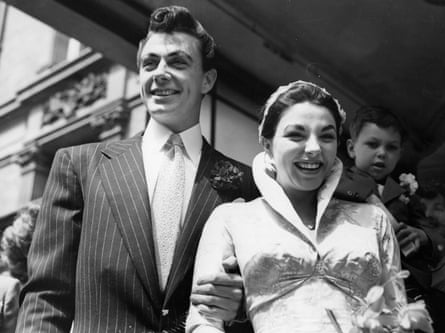
It’s a typical Collins reaction – to laugh it off. She has never seen herself as a victim. Whenever she was wronged or abused by the men in her life, she somehow coped and eventually bettered them. She has a great throaty cackle of a laugh, however bleak the subject, and I tell her as much. “Thank you – that’s what Percy said when he fell in love with me.”
Astonishingly, Reed went on to be her first husband. You married your rapist, I ask, still not quite believing it. “Yes, because I come from a generation where if you’re going to have sex, you get married.” When she discovered that he was offering her to older men for £10,000 a night, on the condition that he could watch, she decided enough was enough. After four years, they were divorced.
Still in her early 20s, Collins decided to take control of her love life. “I lived with several men, one after another. I was a serial monogamist.” Did you regard yourself as unconventional? “Yes, I realised I was unconventional. I thought: there’s nothing wrong with this. I lived with Sydney Chaplin, then Arthur Loew Jr, then I had an affair with a married man – it was utter hell.”
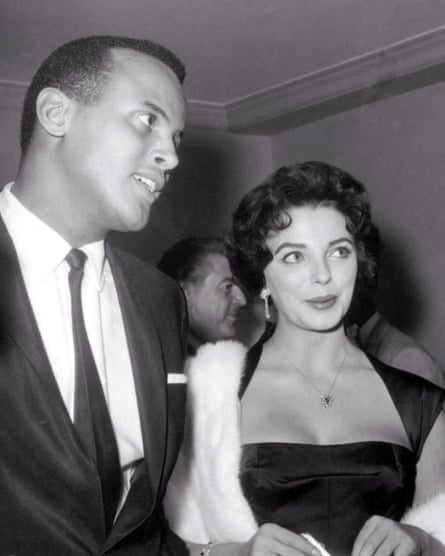
Was that the only time? “Yes, I would never do it again.” Why was it such hell? The deceit, she says. “He was very handsome, very urbane, incredibly witty. Fascinating. And eight years older than me.”
George Englund was a film director, married to the actor Cloris Leachman at the time.
“It’s no secret any more. I went with Warren [Beatty] sort of to get over George.”
Meanwhile, in Hollywood, time and again she dodged the casting couch. In her new autobiography Behind the Shoulder Pads, she writes that she was promised the role of Cleopatra in Joseph L Mankiewicz’s movie if she agreed to be “nice” to the head of Fox, Buddy Adler, and the chairman of the board. “I couldn’t and I wouldn’t – the very thought of these old men touching me was repugnant. This was a time when actors and directors and producers took it as their right to take their pick of the pretty young actresses, and it was very sad. I never went along with that. Ever. Never the casting couch.” The part of Cleopatra eventually went to Elizabeth Taylor.
The most searing chapter in the book is when Collins writes about becoming pregnant at 26 with her fiance, Beatty, then a 23-year-old aspiring actor, and having an abortion. Beatty does not come out of it well.
When she told him she was pregnant, he asked how it happened and told her it was “terrible”. On the morning of the procedure, she felt she couldn’t go ahead with it. Beatty said she had to because it would wreck their careers. All these years later, she says Beatty was right – if she had had the baby, her movie career would have been kaput, and most importantly she wouldn’t have gone on to have her three children – Tara and Alexander with husband No 2, the actor and singer-songwriter Anthony Newley, and Katyana with No 3, the businessman Ron Kass.
Her first four husbands all failed her in shocking ways. She loved Newley, but then he cast her in his film Can Heironymus Merkin Ever Forget Mercy Humppe and Find True Happiness?, about a superstar singer and serial shagger. She realised the film was autobiographical and that did for their marriage. When she married Kass, he had recently lost his job as the head of the Beatles’ label, Apple. Almost immediately, he became dependent on her for money to buy heroin. In 1985, she married husband No 4, the former pop star Peter Holm, who, according to Collins, was an abusive, money-hungry cheat. She refers to him only as the Swede. They divorced in 1987.
Can you rank your husbands? “Well, you know who the best is – I don’t have to go there.” And the worst? “Maxwell Reed.” Second worst? “The Swede.” And the others? “No, they’re both the fathers of my children. I’m not going to go into that.” With Newley and Kass, she says, there were great times. “When I was married to Ron, we had six children between us.” How did you cope? “Very, very well. I’m a very good mother. I made huge lamb stews and toad-in-the-hole – always one big thing. I loved being a mother, and I’ve been a full-time mother a lot of times, and a single mum, and that is not easy. My heart goes out to single mums, particularly when you’ve got a job that is not 9-to-5.”
Collins looks at my notepad. “What’s that? Your crib sheet?” She is nibbling her way through her salad. “Mmmmmm,” she says as if it’s the finest thing she has ever tasted in her life. “This is … boring!” I think she means the salad, but it could be me. She is definitely not impressed when I ask her which of her thesp friends is her favourite. “No, I’m not going to say that. That would be unfair. It’s a boring question. Come on, Simon – you can do better than that! Consult your crib sheet!”
“I bet you tell some good stories in the poob,” she says, going all northern on me. “I bet you do – about the people you’ve interviewed. Which actress have you liked best?” I am not sure where to start. “Helen Mirren?” she offers. “I bet you like Helen Mirren.” I do, I say. “And your favourite?” Penélope Cruz, maybe. “Oh yes, she’s lovely. Was she interesting?” she asks pointedly. OK, Tilda Swinton, I say. “Oh God, yes – she must be brilliant. I’ve met her.”
“Who didn’t you like?” she asks. Before I have opened my mouth, she answers for me. “Ben Kingsley! Nobody likes Ben Kingsley.” He insists on being called Sir Ben, I say. “How ridiculous! It’s amazing how overly privileged some actors are. I hate that, because the few who are like that taint the rest of us.”
It’s almost half a century since she made The Stud and The Bitch. While the films were hardly masterpieces, they were radical in their own way. Back then, it was almost unheard of for women in their 40s to play sexy and powerful. I tell her I saw a quote from Joanna Lumley saying that, back in the day, actresses always had to take their tops off, and she hated it. I assume that, in Collins’s case, she had made the decision and was in control (both films were adaptations of her sister’s novels). She shakes her head. “I hated it. I know there are some women who can do it, but I’m a bit shy.”
If you found undressing for the camera uncomfortable, what led you to strip for Playboy in 1984? She looks at me, as if it’s the most stupid question in the world. “I got paid $100,000.”
She cites a sex scene that made her particularly uncomfortable. “I particularly hated doing it with George Peppard in The Executioner, because he hated me and I hated him.” Why did you hate him? “Because he made a pass at me before we went on set. A lot of actors took it as their divine right to have sex with their leading ladies. We’d been to a pre-production party and he’d had a bit to drink and he said he’d drop me home, so I said OK.
“Then at the door he did the usual thing and I said: ‘I’m sorry, I can’t,’ and he said: ‘What’s wrong with you?’ I said: ‘I’m married and I’ve got two children.’” What was the usual thing? “Well, you know, grab-grab.” When he didn’t get what he wanted, he told her she was a “square”.
Was it stressful making the movie with him? “Yes, because he didn’t speak to me all the way through. Thank God he didn’t play the lead in Dynasty. You know he was cast as Blake Carrington, before it became Dynasty when it was called Oil? After two episodes, he was fired by [the executive producer] Aaron Spelling because he was so obnoxious and difficult and appalling. So I’ll vouch for that.”
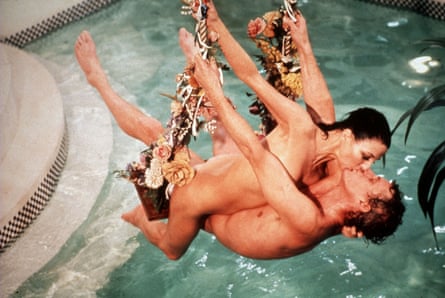
Collins’s first novel, Prime Time, was published in 1988, a year before the original Dynasty ended. How did Jackie feel when her sister also started writing bonkbusters? “Bonkbusters? How dare you? Hahahaha! We didn’t really discuss it at all. It was the elephant in the room.” Do you think it caused tensions? “I think it did for a while, yah. And then everything smoothed over.” In general, she says, they were not competitive about their success. “It was different. I was an actress.”
She misses Jackie terribly. “My sister died of breast cancer, and I’d been nagging her for years to go and have mammograms, because I did. I was terrified of getting it.” Jackie had never had a mammogram? “No. She didn’t believe in doctors. She wouldn’t go to the doctors. It’s very sad. Very sad.”
There are so many people who have died that she misses, she says. She tells me about the time she was at Rada and the teacher made fun of a boy because he had a Manchester accent. It wasn’t Albert Finney, was it? “No!” she says wistfully. “I can’t believe Albert Finney’s dead. And Dudley Moore and Peter Cook. When I was married to Tony and we lived in New York, all of those people were the Young British Turks. Jonathan Miller, Peter O’Toole, Buddy Greco, Paul Anka, that was a great generation. I used to cook for them all on Sundays – Sunday roast with the full-on roast potatoes, like my mother did.”
These days, she splits her time between London, Los Angeles and the south of France. I ask her if Britain has changed much in her life. “Come on! Are you seriously asking me that question? Does Britain seem to have changed? Yes! I defy you to drive down any street that doesn’t have the road up or scaffolding. Thank you, Mayor Khan: that’s all I’m going to say about that.”
I don’t quite see how you can blame Sadiq Khan, the mayor of London, for the state of the whole country, but she is on a roll. “And there’s this Ulez thing. I’ve got a lot of friends who don’t have that much money, and having to pay tariffs to come into London …” Having said all this, she insists Britain is the greatest country in the world. “Why do you think every immigrant wants to come here?”
In the late 1990s, she became a guest diarist for the Spectator, then edited by Boris Johnson. “I love Boris!” she says. Would you like to see him back in politics? “I’m not going to answer that question. I know the newspaper you work for. I really don’t think actors should get involved in politics. Everybody knows that I’m not terribly woke, as it were.” At one point, Collins was a patron of Ukip, although at the same time she said that didn’t mean she would vote for the party.
She has always had friends in high places. King Charles is said to have written a letter celebrating her decolletage; she once played a game called What Have We Never Done? with Prince Andrew; and she met the Queen on numerous occasions. Did her majesty ever give Collins good advice? “No. I don’t think the queen’s an agony aunt. No.”
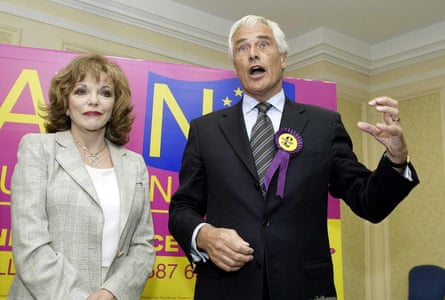
She was also friends with Margaret Thatcher. “Loved her. Loved her to bits! I was at her 80th birthday, but she was very frail then. She could hardly stand up. And you know the Queen and Philip came to that party. I went to her funeral. I was so sad. I think she was destroyed by the jealousy of the men in parliament. I really admired her strength. She said something, and it might have been unpopular, but she went ahead with it.” Does she see something of Thatcher in herself? “I suppose if I sat down and analysed it, but I never have.”
I ask if she has ever considered retiring. She looks appalled. “No. The thing is, actors can go on for ever, because there are always roles for them.” She was outraged when introduced at an event as “the ex-actress Joan Collins”. There is nothing “ex” about her – and she hopes there never will be, as long as she still has breath in her.
“The project I’m most excited about is a script that’s been written for me called In Bed With the Duchess, by Louise Fennell,” she says. “It’s the true story of the last years of the Duchess of Windsor after the Duke dies. She was abused by this woman who took her over and took away her objects, her money, and left her practically destitute.” The more she talks about it, the more animated she becomes. “So you see her first of all when she’s full of pep and she’s got her young acolytes around her, then bit by bit she is destroyed by circumstances. It’s a very good script and it’s a great part for me. I’ve always been fascinated by Wallis, because I think she was unfairly treated.”
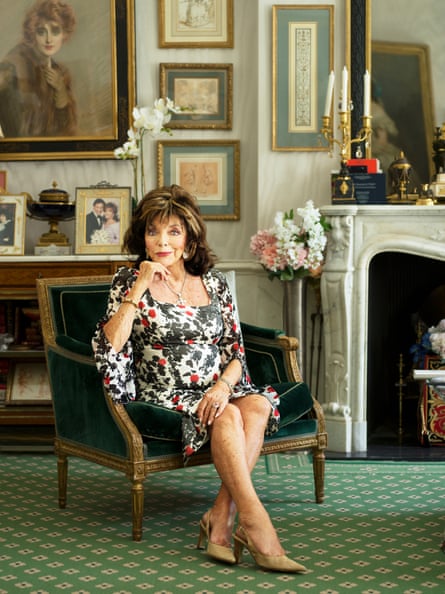
She asks the waiter for an espresso. “I need the coffee to wake me up.” I try not to take offence and tell her that one of my favourite performances of hers was in a short film called Gerry that she made five years ago. It’s quiet, subtle, understated – everything you don’t expect from Collins. “See, you sound surprised. I can act, you know. I don’t just do the sophisticated bitch parts.” You are fabulous in those, I say, but it’s great to see you doing something so different. “Thank you. Thank you so much. I won two awards for it,” she says proudly.
“I wish we didn’t have to go out tonight,” she says to Alex.
Where are they off to?
Collins becomes coy. “Ah, it’s a secret! How many words do you have to write?” Loads, I say. “Two thousand?” she guesses.
“Two thousand?” I say. “I don’t get out of bed for less than 2,500.”
“Very good. Touché! Well, please be kind.”
She asks if I will be going to her show and says how much she is looking forward to it. “I’ll be talking about lots of old stars, and in the second half I take questions from the audience.” What do they tend to ask about? “My beauty routine and ‘Who was the best kisser of all the actors you’ve worked with?’”
Good question – who was it? “Paul Newman.” In a relationship or a film? “In a film.” Do they ask who her best lover was? “Yah, I hedge that question. I always say: ‘My husband.’” Percy? “Yes, and it’s probably true.”
Collins has such zest. She tells me she has been blessed with the happy gene: “I’m so lucky to have that.” Has anything interrupted the happiness? “Yes, many things. Many, many things. My youngest daughter had a terrible accident. I’ve been sued by Random House. All my husbands except Tony sued me for money. I have been embezzled by business managers and husbands. Yeah, a lot of things.” But her happy gene remains intact.
As she puts her shades and hat back on, she tells me about her plans for the next few days. “Tomorrow we’re going to Ascot and we’ve got a few social things going on this week. Then my son is coming in with the baby and we’ll be hanging out with the baby and doing things till we go to the south of France.” Your appetite for life seems undiminished, I say. “Yes, absolutely,” she says fervently. “You have to eat life or life will eat you.”
Joan Collins tours the UK from 1 to 24 October; tickets are available at amickproductions.co.uk. Behind the Shoulder Pads: Tales I Tell My Friends is published by Seven Dials on 28 September in hardback, ebook and audiobook. To support the Guardian and the Observer, order your copy at guardianbookshop.com. Delivery charges may apply
